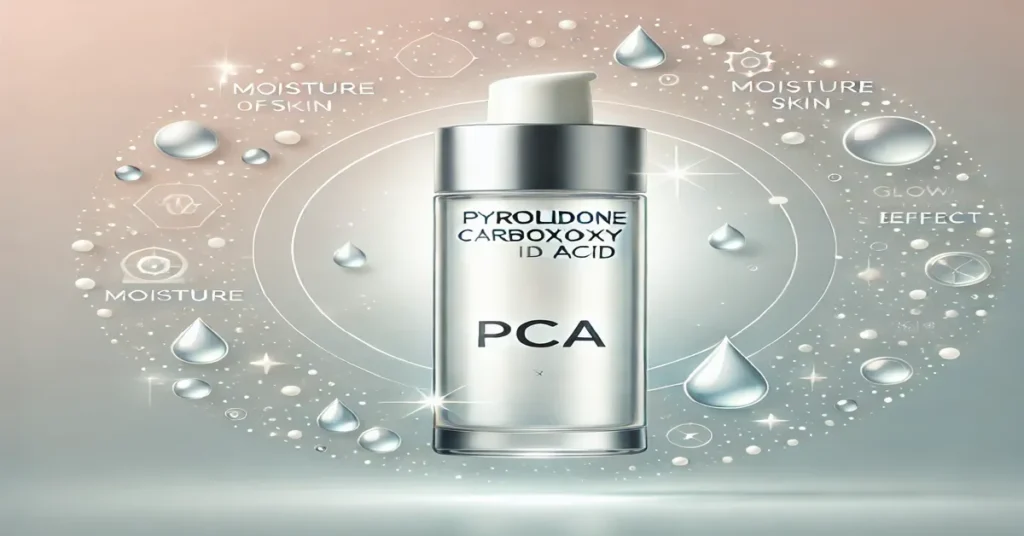pyrrolidone carboylic acid skin is becoming increasingly popular in the skincare industry due to its moisturizing and skin-soothing properties. Commonly known as PCA or sodium PCA, it’s a natural component found in the skin and plays a crucial role in maintaining hydration. This guide explores everything about pyrrolidone carboxylic acid, its benefits, usage, safety, and impact on various skin types.
What is Pyrrolidone Carboxylic Acid?
Pyrrolidone carboxylic acid skin is a derivative of the amino acid L-glutamic acid. In skincare products, PCA is primarily used in its sodium salt form, known as sodium PCA. PCA and its salts are humectants, meaning they attract and retain moisture in the skin. As a significant component of the skin’s Natural Moisturizing Factor (NMF), PCA helps maintain the skin’s hydration and elasticity, making it an ideal ingredient for skincare formulations targeting dryness, sensitivity, and aging.
The Science Behind Pyrrolidone Carboxylic Acid
PCA is naturally present in our skin, comprising about 12% of the NMF. The NMF is a mixture of compounds, including amino acids, urea, and PCA, which work together to keep the skin hydrated and supple. PCA functions by binding water molecules from the environment, drawing them into the outermost layer of the skin. This process of hydration is vital to maintaining the skin’s barrier function, texture, and overall health.
When applied topically, PCA mimics the natural hydration processes of the skin. Its compatibility with skin makes it effective for a wide range of skin types, especially for those with sensitive or dry skin.
Benefits of Pyrrolidone Carboxylic Acid for Skin
PCA’s primary benefit is its ability to improve skin hydration. However, it offers several other skincare benefits that make it a valuable ingredient in many products.
1. Superior Moisture Retention
- pyrrolidone carboylic acid skin can hold multiple times its weight in water, which makes it highly effective at providing long-lasting hydration. Unlike many other humectants, it does not create a sticky or greasy feel, which allows it to be used in both light and rich formulations.
2. Skin Barrier Protection
- By attracting moisture into the skin, PCA strengthens the skin’s natural barrier. A robust barrier is crucial for protecting against environmental damage, irritants, and allergens. This is particularly beneficial for individuals with compromised skin barriers, such as those suffering from eczema or psoriasis.
3. Soothing and Non-Irritating
- Unlike some other moisturizing agents that may cause irritation, PCA is generally well-tolerated by all skin types, including sensitive skin. It helps soothe irritation and calms redness, making it suitable for products formulated for sensitive or reactive skin.
4. Anti-Aging Properties
- As skin ages, its ability to retain moisture declines, leading to dryness, wrinkles, and loss of elasticity. PCA helps mitigate these signs of aging by boosting skin hydration, which can reduce the appearance of fine lines and wrinkles. It also improves skin texture and elasticity over time.
5. Compatibility with Other Ingredients
- PCA is stable and effective in a wide pH range, meaning it can be easily incorporated into a variety of skincare formulations. It works well with other humectants like hyaluronic acid, glycerin, and aloe vera, enhancing its hydrating capabilities.
Uses of PCA in Skincare Products
PCA is found in various skincare products, including:
- Moisturizers: pyrrolidone carboylic acid skin is used to boost the hydrating properties of moisturizers. In these products, it helps maintain skin hydration, leaving a smooth, plump feel without heaviness.
- Serums: Hydrating serums often contain PCA as a key ingredient to provide intense moisture. Due to its lightweight nature, PCA can penetrate deeper into the skin, offering hydration at multiple levels.
- Cleansers: Including PCA in cleansers prevents them from stripping away natural oils, making them gentler on the skin.
- Sunscreens: Some sunscreens incorporate PCA to keep the skin hydrated and balanced while offering UV protection.
- Masks and Treatments: pyrrolidone carboylic acid skin is used in masks and treatment products designed for deep hydration and repair, suitable for overnight or intensive skincare routines.
How PCA Works with Different Skin Types
PCA’s versatility makes it an ingredient suitable for a variety of skin types.
1. Dry Skin
- For individuals with dry skin, PCA can help reduce flakiness and rough texture by attracting moisture into the skin. This helps the skin feel smoother and more comfortable.
2. Oily and Acne-Prone Skin
- People with oily skin can also benefit from PCA. Since PCA is a lightweight humectant, it hydrates without clogging pores or feeling heavy, reducing the skin’s tendency to overproduce sebum as a response to dryness.
3. Sensitive Skin
- Sensitive skin types will find PCA beneficial because it hydrates without causing irritation. It’s gentle enough for daily use, making it ideal for people who experience redness, inflammation, or irritation.
4. Aging Skin
- Aging skin, which tends to lose moisture and elasticity, can benefit significantly from PCA’s hydrating and plumping effects. Its use can help to smooth out fine lines and wrinkles, making the skin appear more youthful and firm.
Safety and Side Effects of PCA
PCA is generally considered safe and non-irritating for all skin types. However, as with any ingredient, individuals with specific allergies or sensitivities should patch-test new products containing PCA before applying them extensively. While PCA itself rarely causes irritation, products with high concentrations of other ingredients combined with PCA could potentially cause sensitivity.
How to Choose and Use PCA Products
When choosing a PCA-containing product, look for it in the ingredients list as “Sodium PCA.” Here are some tips for incorporating PCA products into your skincare routine:
- Start with a Cleanser Containing PCA: This can provide gentle hydration while cleansing.
- Follow with a PCA Serum: Apply a serum with PCA after cleansing for deep hydration.
- Use a PCA Moisturizer: To lock in the benefits, apply a moisturizer with PCA on top of the serum. This can create a barrier that holds moisture throughout the day or night.
- Check Concentration: Although PCA is effective at low concentrations, choosing products with around 1-5% PCA can provide optimal benefits.
Pyrrolidone Carboxylic Acid vs. Hyaluronic Acid: A Comparison
PCA and hyaluronic acid (HA) are both powerful humectants, but they have unique properties:
- Water Retention: Both PCA and HA attract water, but HA can hold up to 1,000 times its weight in water, whereas PCA holds slightly less. However, PCA is lighter and less sticky, making it more suitable for oily or combination skin.
- Application in Products: HA is commonly found in thicker formulations like creams and gels, while PCA is often used in lighter serums and lotions.
- Compatibility: PCA’s natural presence in the skin makes it a gentle and non-irritating option for sensitive skin, whereas HA, though generally safe, can occasionally cause sensitivity in very reactive skin.
Both ingredients can be used together in a skincare routine to provide maximum hydration and plumping effects.
Conclusion
Pyrrolidone Carboxylic Acid (PCA) is a valuable skincare ingredient known for its remarkable ability to retain moisture, strengthen the skin barrier, and improve skin elasticity. As a naturally occurring component of the skin, PCA is compatible with most skin types, making it a versatile addition to moisturizers, serums, and other skincare formulations. With its low likelihood of causing irritation and ability to pair well with other ingredients, PCA is an effective choice for individuals seeking to enhance their skin’s hydration and resilience.
Frequently Asked Questions (FAQs)
- Is PCA safe for sensitive skin?
- Yes, PCA is gentle and generally safe for sensitive skin. It hydrates without causing irritation, making it suitable for daily use on delicate or reactive skin.
- Can PCA be used with other active ingredients?
- PCA is compatible with most active ingredients, including hyaluronic acid, vitamin C, and retinoids. It can enhance hydration without interfering with other skincare products.
- Does PCA clog pores?
- No, PCA is a lightweight humectant and does not clog pores. This makes it a good choice for people with oily or acne-prone skin.
- How often should I use products with PCA?
- PCA can be used daily, both morning and night, depending on the product formulation and skin needs. Products like moisturizers and serums containing PCA are suitable for regular use.
- Can I use PCA with hyaluronic acid?
- Yes, PCA and hyaluronic acid work well together. While hyaluronic acid draws in moisture, PCA helps maintain it, providing long-lasting hydration.
- What types of products typically contain PCA?
- PCA is commonly found in moisturizers, serums, cleansers, and masks designed for hydration and skin barrier support. Look for “Sodium PCA” on the ingredient list.
4o







